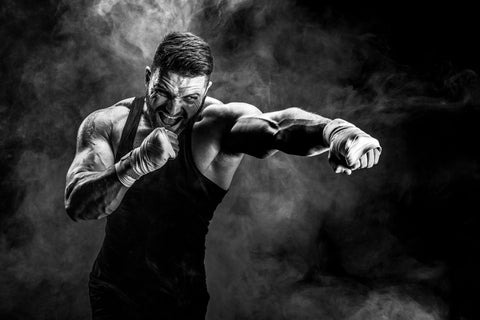Authentic Masculinity vs Toxic Masculinity
If you are looking for information to help you optimize your masculinity and improve your chances of success then you have come to the right place.
Throughout this article we explore some of the concepts of masculinity and look for historic, scientific and anecdotal evidence as to how we can leverage authentic masculinity for positive purposes. Read on to discover valuable information towards your personal development.
Let’s start by exploring the concept of toxic masculinity.
What is Toxic Masculinity?
The phrase toxic masculinity is usually associated with beliefs and behaviors with the potential to be counter productive and even harmful to yourself and society. The perception of masculinity itself can be dependent on the culture and environment you were raised in and where you live. As you read this article you are therefore likely to put things into the context of your specific beliefs, which may be influenced by the society you are used to. We will take an objective view for this reason.
If you consider some of the most common and traditional stereotypes of masculinity, men are seen as hunters and providers, needing to display power, dominance and keep distance from weakness and vulnerability. Whilst you can argue both for and against the traditional views of masculinity, a need for dominance has the potential to tip over the edge and lead to destruction if it’s not controlled and we are not conscious of the impacts our actions can have on the people and world around us.
So how do you separate healthy masculinity from that which could be classed as toxic? Well let’s start by taking a look at some specific examples of what behaviors can fall into toxic masculinity:
- Conforming to outdated and harmful stereotypes out of choice or due to social pressures.
- Promoting violence and acting aggressively, unnecessarily.
- Having misogynistic or homophobic views or tendencies.
- Needing to be socially dominant to feel important and masculine.
- Needing sexual conquest to prove masculinity.
- Acting destructively due to insecurity, misguided pride or arrogance.
- Being close minded, stubborn and selfish.
- Withholding important feelings or emotions because could be stigmatized as weakness.
If you display some of these behaviors, then you should consider the following:
- You are in effect promoting these behaviors as acceptable.
- If enough people act this way, then it becomes a society norm. Is this the path we want our world to go down?
- You may decrease your chances of becoming successful. For example, close-mindedness and stubbornness may limit your opportunities and the strength of your current and future relationships.
- You may be causing yourself unnecessary harm. Suppressing too many feelings or emotions is unhealthy. You feel and think these things for a reason, and it can help to talk about them.
- A preoccupation with being perceived as weak will soak up your energy with very few real benefits. Is it not in fact a weak trait to be constantly worried about looking weak?
- Any pleasure you attain from these behaviors is likely to be at the expense of others. It’s a competitive world and to be successful we need to stand out, but do these types of actions justify the potential consequences?
The most extreme cases that can be linked to toxic masculinity often make the headlines, sometimes internationally. Here are some examples of these extreme instances:
- The new Delhi bus rape case that caused international outrage, lend to new anti-rape laws and resulted in the execution of the perpetrators
- The now infamous case of Jeffrey Epstein, who used his wealth and power to exploit women for sexual gratification
- The killing of Damilola Taylor in London. A result of a senseless attack by a group of youths who accused him of being gay. Before his killing there is evidence that shows he was subjected to continuous homophobic assaults and abuse.
These types of extreme situations clearly can’t be attributed purely to issues of masculinity, but the point remains that societies and cultures around the world need to do more to help restrain the misguided views or beliefs that contribute to inevitable tragedy.
Change on a large scale requires the input and support of many individuals. Whilst you can’t always control the views and actions of others, you can control your own.
Let’s now explore masculinity and the male psyche from another angle and take a look at the concept of stoicism.
What is Stoicism?

Firstly, if you are wondering how to pronounce stoicism, it can be broken down into ‘stow-uh-si-zm’. It’s a topic that is often misunderstood and sometimes unfairly associated only to people who lack feelings or emotions.
Founded by Zeno, stoicism is a philosophy of personal ethics and was designed to help guide followers to happiness (referred in the teachings as eudaimonia). Whilst we wouldn’t go as far as to recommend you necessarily follow stoicism as a philosophy, some of its teachings are useful and relevant to our discussion.
Stoics believe that happiness is more achievable by living in the present, mitigating the consequences of your desires for pleasure or the fear of pain, and treating others fairly and justly. Particularly popular in the Roman and Greek era around the 3rd Century, a high profile follower was Emperor Marcus Aurelius.
When you consider our topic of authentic masculinity, there is perhaps some value to be gained by the importance that stoicism places on self-control in overcoming potentially destructive emotions, and its objective to support your ethical and moral well-being in the pursuit of happiness.
There are 4 cardinal virtues in stoicism:
- Courage
- Wisdom
- Temperance
- Justice
There is some synergy here with traits that that are likely to help you become successful. You can read more about that in our post on 11 key traits and 116 inspirational quotes.
To expand further on this, let’s look at some exercises that a stoic might practice (put into plain language from the teachings):
- Take time in the morning to reflect.
- Practice self-control.
- Put yourself in a position of poverty (actually do it, not just imagine it) for a couple of days a month to help take away anxiety and fear from potentially bad situations. It can help you learn that you are able to tolerate living a basic life and it is something you can always recover from.
- Remember that you are a small part of a big universe and we are all equal. This can help you avoid stubbornness, narcissism or unfairly judging others because of their preferences.
- Meditate and consider your mortality as you do so. This is not designed to depress you, but more to give you a refreshed zest for life and to learn not to take a single day for granted.
- Imagine and preempt things that could go wrong so you can be prepared in case they do.
- Live in the moment.
- Learn to take a macro or objective perspective on things.
- Train your perceptions and learn to see the opportunities in difficult situations.
- Contemplate what the ideal man looks like and aspire to become him.
- Keep a journal – we refer to the benefits of keeping a journal as a useful tool to boost self-awareness in our 10 steps for success.
As you read these example stoic practices, you may start to connect some of them to traits seen in many successful people. Whether that is because they follow stoicism, use parts of it they find useful or it’s just a coincidence, the connection is there.
Our view on the stoic philosophy is that it is certainly a useful thing to be aware of, and there are some definite benefits to be learned on your journey to be the successful man you want to be, with strong morals and integrity. It may help you to accept the curve-balls life throws at us, to see the opportunities instead of dwelling in self-sympathy, and to prevent allowing your feelings or emotions to undermine your ability to see reason or logic.
Remember, we are not suggesting that you hide or relinquish your emotions, quite the contrary, learn to use them to your advantage and don’t be afraid to have them and talk about them. Just do it in the right way.
For a little added inspiration, let’s round of the section on stoicism with some useful quotes from it’s famous followers:
“Waste no more time arguing what a good man should be. Be one.” – Marcus Aurelius
“It never ceases to amaze me: we all love ourselves more than other people, but care more about their opinion than our own.” – Marcus Aurelius
“If it is not right, do not do it, if it is not true, do not say it” – Marcus Aurelius
“Be tolerant with others and strict with yourself” – Marcus Aurelius
“We are more frightened than hurt; and we suffer more in imagination than reality” - Seneca
“He who fears death will never do anything worth of a man who is alive” – Seneca
“Life is very short and anxious for those who forget the past, neglect the present and fear the future” – Seneca.
“How long are you going to wait before you demand the best for yourself?” - Epicetus
“First say to yourself what you would be; and then do what you have to do” – Epicetus
“When we are no longer able to change a situation, we are challenged to change ourselves” – Viktor Frankl
Man conquers the world by conquering himself” – Zeno
Ok, so far we hopefully have a better understanding of what toxic masculinity is, and how some stoic principles can help counter it. Now we move on to take a look at what are traditionally regarded as masculine traits and explore their pro’s and con’s.
What are Masculine Traits?

Let’s start out with highlighting the caveat that this can be a subjective question. We mentioned at the beginning of this article how the society and environment that you are used to can influence your perception of masculinity, and so it may be the case for this section.
For the purposes of objectivity, we will firstly explore the four different types of masculinity and their relationships with each other.
What are the Four Types of Masculinity?
1. What is Hegemonic Masculinity?
Hegemonic masculinity promotes the stereotypical heterosexual values. It supports the dominant position of males in society, is influenced by a stigmatization of homosexuality and justifies a subordinate positioning for women and the less-dominant male population.
Typically associated traits include someone who is white, physically strong, highly competitive, shows consistent signs of anger or aggression in their approach and is unable or unwilling to express general emotions or weakness. Added to this is an inferior view of feminine attributes, whether in men or women.
How does this sound? Do you know people or are you someone who would fit into this category? As a matter of fact, this tends to be a very common form of masculinity across Western society as well as many other parts of the world. Not only that, but it is often celebrated and even seen as the standard of masculinity to aspire to.
Try now referring back to our section on toxic masculinity. Cross reference the attributes and see if you spot connections with hegemonic masculinity.
2. What is Subordinate Masculinity?
Men that fall into this category are usually perceived as lacking some of the characteristics in hegemonic masculinity, but also having different qualities - occasionally in stark contrast. Sometimes associated with homosexuality, men categorized as ‘subordinate’ may have more typical feminine traits and feel more comfortable with displaying emotions.
Another contrast with hegemonic is the fact that subordinate masculinity is linked to a lack of success with women. This article explores the links with subordinate masculinity and violence, with case studies of extreme consequences. It highlights the potential for violence in need of revenge or relinquishment of subordination.
3. What is Complicit Masculinity?
The word ‘complicit’ in this context refers to he fact that this form of masculinity is not hegemonic, but doesn’t challenge it either. The complicity may be out of choice or an acceptance for this temporary status whilst trying to achieve hegemonic masculinity.
It would be easy to treat complicity as a lesser or weaker form of hegemonic, but it does have it’s place and advantages. Consider the fact that dominance is not a permanent benefit and there are many occasions that it can be counter-productive. For example, take marriage, work, fatherhood and fitting into society and imagine if every man approached these in a dominant way. There would be chaos.
Life can often be about compromise and men who have some of the qualities or capabilities of complicit masculinity may find compromise easier and more natural. Their respect and tolerance levels may be higher as well as a greater appreciation for a more balanced society.
Don’t be fooled into thinking complicity is always weak. Sometimes it may be the smarter or even stronger approach to take. It depends on the circumstance.
4. What is Marginalized Masculinity?
If you are marginalized then you may be treated as insignificant or peripheral, and so a man falling into marginalized masculinity is perhaps unable to conform to the traditional definition of hegemonic, even if they display most of the requirements.
Characteristics out of your control, such as having a disability or being non-white can therefore lead someone towards being classified as marginalized.
Whilst these are the four types of masculinity commonly used for studies and examination of the principles of masculinity itself, you may read through them and feel like you don’t fit perfectly into a specific category. Don’t worry this is normal and quite frankly to be encouraged.
People are too diverse and unique to be categorized into one of four pre-defined brackets, and we wouldn’t expect you to try to pigeonhole yourself into any. Aside from the stigmatization, you may have some qualities of all the types of categorized masculinities.
Try to view this grouping purely as an exercise to increase your knowledge on the theory of masculinity. Supplement it with you own beliefs and the other information you have read in this post so far.
Remember that we are not trying to diminish the value or power of masculinity, quite the contrary. Masculinity can be a powerful strength if harnessed effectively, our goal is to understand what that means and what the best approach could be.
Back to the Key Masculine Traits
So now we have a bit more background, are we closer to understanding our original question ‘what the key traits of masculinity’? Well the frustrating answer is not really, no. This is because the key traits would depend on which type of masculinity you believe is correct (if any), and your subjective opinion.
If we were to take a traditional view from Western society, then you could argue that key traits would include things like strength, courage, leadership, assertiveness and perhaps independence. But do these traits appropriately define a good, successful man? Clearly this will not always be the case.
We explore key traits in more detail in the context of helping you become successful in our post on 11 key traits and 116 inspirational quotes. For the purposes of this article on masculinity however, we are going to go on to propose our support for a more modern form of masculinity. Authentic masculinity.
What is Authentic Masculinity?

Now we are certainly not the first to coin the phrase ‘authentic masculinity’, but as a conversation about it already exists we thought we could share our opinions on the matter instead of trying to reinvent the wheel with a new term for a more modern form of masculinity. One that can be more advantageous to society.
In our opinion, in order to be able to display true authentic masculinity, you would first need to have the right amount of knowledge, awareness and self-awareness. This understanding is crucial to help you form a balanced and beneficial way forward. Hence our review of masculinity as you have read above.
Assuming your understanding is at a good level, now consider what type of characteristics and behaviors, if demonstrated in enough people, would give the most benefit to society as a whole. What is realistic and likely to achieve the most for the greater good?
We performed this exercise among ourselves and came up with an extensive list, too long to publish in this post without sending you into a hypnotic state. The next step was therefore prioritization – picking out the most important pieces that have the potential to do the most good.
So here, in no particular order, are our suggestions as to the most important characteristics for authentic masculinity, broken down into 10 points:
- Being able to consistently demonstrate high levels of respect and integrity, regardless of the pressures of society or stereotypes
- Having a balanced outlook – being encouraging, tolerant and promoting equality
- Consciously developing yourself to have healthy levels of self-esteem and self-confidence. You can check out our self-esteem blog for more on this.
- Taking responsibility and ownership for yourself, your actions and your future.
- Having vision and direction in life. Supporting others around you who are united in your vision.
- Aligning your vision, actions and behaviors with your internal values, morals and beliefs.
- Being assertive in the right way at the right time. Understanding the difference between assertiveness and aggression.
- Being approachable, tolerant and selfless.
- Staying open-minded and adaptable. The world is constantly changing, you need to learn to adapt with it.
- Not being afraid or unwilling to display and talk about your feelings and emotions. Do it appropriately and honestly, sense checking against logic and reason beforehand. Learn from the stoics.
It is not a coincidence that some of these points are in direct opposition to our examples on toxic masculinity, but we would re-iterate again that masculinity itself can be a powerful force for progress and for good.
We have yet to meet anyone who is the perfect example of flawless masculinity. Part of being authentic is accepting your weaknesses and learning to better yourself to live with them more effectively. Giving an outward perception of authenticity is not genuine if it is not supported by your internal beliefs.

We encourage you to be yourself. Learn to understand yourself as thoroughly as possible so you know what to work on and what strengths to leverage. For more advice on how to build self-awareness read step one of our 10 steps to success.
Most of all, be mindful of the impact of your actions and behaviors on the people around you and society as a whole. We all have a part to play in making the world a better place for generations to come. Play your part - learn to be authentic.
We would love to hear your thoughts on our exploration and suggestions regarding masculinity and of this article as a whole.
What do you feel are the most important characteristics for authentic masculinity? How should we behave to be able to take the world forward for the better? Share your opinions, observations and questions in our comments box below.




